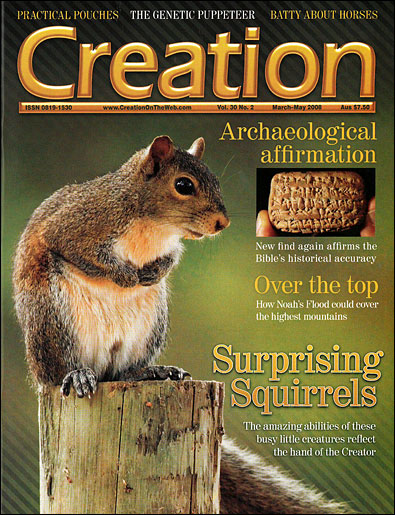Creation: antidote for depression
Editorial
‘Now I realize why I’ve been depressed for so long’, a man with dishevelled hair, baggy clothes and unkempt beard told me after a meeting one evening. He said he had always accepted evolution was a fact. That night he realized that this evolutionary belief was the reason for his dark despair and feeling of emptiness.

He went on, ‘After tonight I feel like there is hope, that there is light at the end of the tunnel.’
Peter Atkins, professor of chemistry at Oxford and an atheist, said that man is ‘just a bit of slime on the planet’. He believes it’s scientific fact that we evolved from pond scum. That’s hardly the stuff to inspire us with purpose and sacrifice.
Antitheist Richard Dawkins is even more dramatic. In his book River out of Eden (ch. 4) he said that we live in a universe that has ‘no design, no purpose, no evil and no good, nothing but blind pitiless indifference.’ He thinks like that because he believes evolution is scientific. I sometimes wonder why he bothers getting out of bed in the morning. Why is he so passionate about spreading his evolutionary views? Misery loves company.
All this illustrates why creation is not an academic issue. Your understanding of where you have come from impacts the way you live now, and that affects your destiny.
The truth is that evolution is not scientific fact. In Creation magazine we show how the scientific evidence supports creation. Don’t take our word for it; see for yourself.
That was dramatically demonstrated by the Oxford philosophy professor Antony Flew. For some 60 years he has been one of the most prominent atheists in the world. In 2004, to the surprise and horror of his colleagues, Flew announced that he was no longer an atheist. He said the biochemical design of DNA and the incredible complexity of living cells convinced him of a supreme intelligence.
And the more that science discovers about the living cell, the more the evidence supports creation by an intelligent designer. In fact, more levels of complexity in the design of DNA have now been identified (p. 42 of this issue of Creation magazine)—information about how to handle information. It’s so amazing that it is breathtaking.
Design in the world, of course, has always pointed to the reality of God. Romans 1:20 says: ‘For since the creation of the world God’s invisible qualities—his eternal power and divine nature—have been clearly seen, being understood from what has been made … ’.
Examples of design are too many to count: the mantis shrimp (p. 12), the monarch butterfly (p. 50), marsupial pouches (p. 35), and the amazing abilities of squirrels (p. 28). All these testify to the hand of the supreme intelligent designer.
But who is the designer? And why are there so many bad things in this world? Science cannot answer these questions. But the Creator himself has spoken to us through his prophets (Hebrews 1:1–2) and given us answers in the Bible.
Believing the Bible is not a matter of blind faith. There’s lots of evidence for its reliability. Archaeological discoveries (p. 14) confirm the Bible’s historical accuracy. Gold discoveries (p. 36) support the biblical timescale. Dinosaur fossils (p. 16) support the account of the global Flood in the Bible. And even tough questions about the Bible often have simple answers (p. 55).
One lady I know of, Brooke, really struggled in her first year as a Christian. ‘I would be a passionate Christian on Sundays, but when I started thinking about creation against evolution I would find it hard to believe in God during the week. It was like a yo-yo between believing and not believing.’
Things changed when she learned about the scientific evidence for creation and realized she could trust the Bible. Brooke said that it helped her find her feet—and her wings.
That’s the sort of stuff that Creation magazine deals with.


Readers’ comments
Comments are automatically closed 14 days after publication.